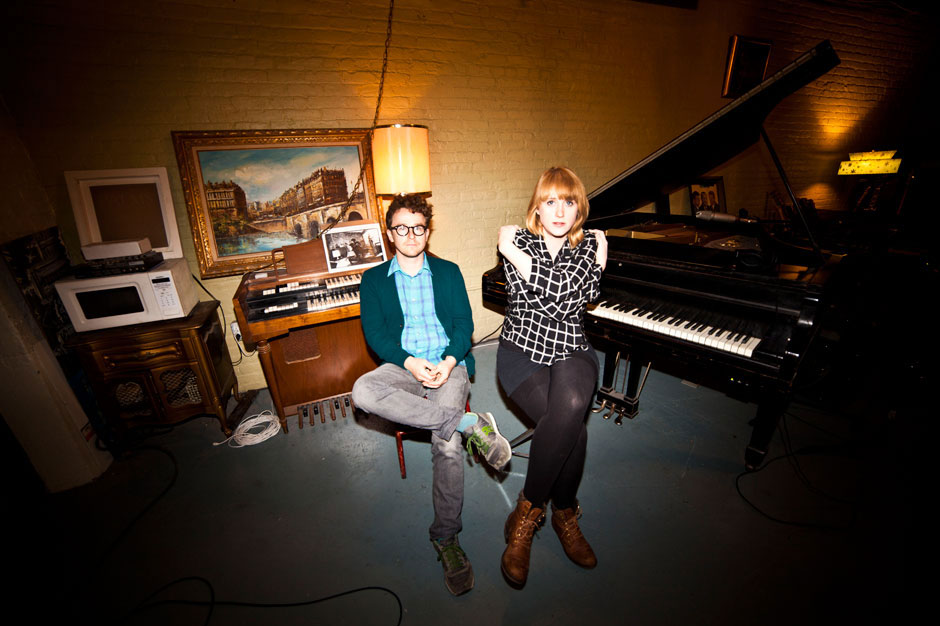“We’ve been really excited,” Wye Oak’s Andy Stack says, “that this record can finally be a time when people put to rest the moniker ‘indie folk.'” The 28-year-old multi-instrumentalist is sitting alongside his bandmate, 27-year-old singer-guitarist Jenn Wasner, inside Rare Book Room, a dimly lit studio decorated with musky furniture, located in the Greenpoint section of Brooklyn. Here, the duo are in the midst of recording their as-yet-unofficially-titled fourth album, due for release in 2014 via Merge Records.
The upcoming full-length follows 2011’s alluring (and profile-raising) Civilian, and marks a drastic shift for Wye Oak’s creative process. “There’s not a lick of guitar on this whole record,” says Wasner, who has now assumed bass-playing duties. “It basically inverts what we were responsible for. Andy was playing droney bass lines on keyboard. Now he’s responsible for the more upper register stuff that guitar would normally handle, while I’m playing bass lines on a bass guitar. The idea was really appealing to me because we had sort of hit a wall, just with the complete and total excess of touring that we had done, the use and overuse of that format. It tainted the guitar for me and I was finding it really, really hard to get anything out of it from a writing perspective. I wasn’t excited about it — too much baggage. It just felt tired to me.”
Wasner found some much-needed inspiration when she stumbled upon the idea of sacrificing her six-string skills. “I sort of fell to the ground in relief and excitement,” she says. “I didn’t want this band to end, but I knew that we needed something new to make us excited about it again. I felt like I had cheated the system. We had found a way to be the same band and yet be totally different, sonically and compositionally, within that framework of our band.”
Stack, who has moved from Wye Oak’s hometown of Baltimore to Portland in the time since Civilian‘s release, shares Wasner’s enthusiasm. “Instruments can interact with each other in different ways that we’re not used to,” he says. “We never had a bass player in this band, or, at least, the bass that we’ve had in recordings in the past has been a secondary thing. When you start having bass be a primary compositional instrument, it interacts with everything else differently.”
“It also means we get to start using words like ‘pocket’ and ‘funky,'” Wasner jokes.
Kidding aside, Wye Oak realize the risk involved with such a reinvention. “There is more at stake then whether my feelings get hurt or not,” Wasner says, anticipating some measure of blowback from fans. “We’ve been touring in this band, making a living off of it since Civilian and we are very fortunate that that has been the case, but we’re both very aware that it could totally go away. But I like what I’m doing enough that I’m confident I will still love it even if people don’t like it. I feel that strongly about it. I don’t think there is any amount of hate and vitriol and backlash that could make me not love it.”
That kind of positivity can be felt all throughout the forthcoming effort, which Wye Oak are self-producing with input from engineer and Rare Book Room proprietor Nicolas Vernhes. “It’s much happier sounding,” Wasner says of the 10-track album. “And lyrically, I think there’s contentment and peace. It’s learning to write and be creative in a non-destructive way. I don’t want to fucking self-destruct all the time. It feels good to be happy and be at peace and learn how to tap into those feelings as well.”





